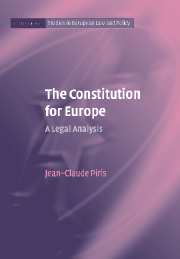Book contents
- Frontmatter
- Contents
- List of figures
- List of tables
- List of boxes
- Series editors' preface
- Acknowledgments
- Table of cases
- List of annexes
- Introduction
- 1 Is The constitution for Europe ‘dead and buried’?
- 2 The process that led to the Constitution
- 3 Changes in structures and procedures
- 4 Changes in the institutions
- 5 Changes in substance
- 6 General Assessment
- Conclusion what will the final form of the union be?
- List of annexes
- Table of equivalences between the provisions of the Treaty establishing a Constitution for Europe and the provisions of the EU and EC Treaties
- List of ‘passerelles’ and provisions on a simplified revision procedure
- Table of references
- Index
6 - General Assessment
Published online by Cambridge University Press: 04 August 2010
- Frontmatter
- Contents
- List of figures
- List of tables
- List of boxes
- Series editors' preface
- Acknowledgments
- Table of cases
- List of annexes
- Introduction
- 1 Is The constitution for Europe ‘dead and buried’?
- 2 The process that led to the Constitution
- 3 Changes in structures and procedures
- 4 Changes in the institutions
- 5 Changes in substance
- 6 General Assessment
- Conclusion what will the final form of the union be?
- List of annexes
- Table of equivalences between the provisions of the Treaty establishing a Constitution for Europe and the provisions of the EU and EC Treaties
- List of ‘passerelles’ and provisions on a simplified revision procedure
- Table of references
- Index
Summary
This general assessment will be made on two levels:
does the Constitution fulfil the mandates that its authors were given by the 2000 Nice Declaration and by the 2001 Laeken Declaration? Would its entry into force succeed in making the Union more democratic and more efficient?
assessment from a legal, economic and social point of view: would it drive the European economy towards a more ‘liberal’ or rather towards a more ‘social’ path? as well as from a political and historical point of view: would it transform the European Union into a federal State or would it rather confirm the present nature of the Union and of its relationship with the Member States?
Section 1: Does the Constitution fulfil the Nice and Laeken mandates?
The Nice mandate
The Constitution addresses all four questions raised in the 2000 Nice Declaration.
The delimitation of powers between the EU and the Member States
The delimitation of powers between the EU and the Member States, though not much altered as compared with the present legal situation, is made clearer for the reader, thanks to the codification, in Part I of the Constitution, of the existing situation both as to the three categories of competences (exclusive, shared and supporting) and as to their content (Articles I‐12 to I‐17 Cst). However, some competences were difficult to categorise and, in any case, they are subject to possible development.
- Type
- Chapter
- Information
- The Constitution for EuropeA Legal Analysis, pp. 179 - 191Publisher: Cambridge University PressPrint publication year: 2006
- 1
- Cited by



